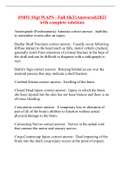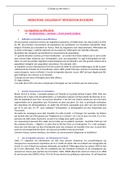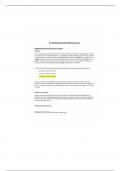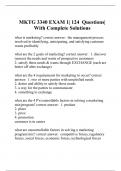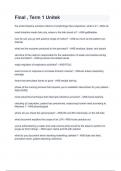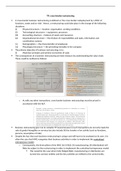Rebecca Linfoot Unit One Exploring Business
The features contributing to the success of contrasting businesses
As a member of the EDU at Pocklington local council, I have researched and collected
information on two contrasting businesses; Tigers Trust (non-for-profit) and Latus Health
(for-profit). With the evidence I have gathered, I am going to report on why both of these
businesses are successful. There are multiple features which make up a business’ structure,
which help contribute to the success.
Ownership, Liability and Sector
A business is the process of generating money through buying and selling products which
include goods and services. There are four sectors a business can fall under, depending on
their role and position, which help categorize what type of business they are. These include:
primary, secondary, tertiary and quaternary. The primary sector is where a business will
take a natural resource and produce this into something, for example, oil extraction.
Secondary, relates to the manufacturing of a product such as taking a diamond and turning
it into a diamond ring. The tertiary sector is where there is a provided service such as a taxi
company, and lastly quaternary is where a business provides their knowledge rather than a
physical good, such as Teletext. Businesses are divided into these sectors, as it allows for a
more in-depth evaluation of the economy as a whole.
Through these sectors, a business can be owned in one of three ways: private, public or not-
for-profit. A private company such as Latus Health is a ‘business firm in the private (non-
public) sector of an economy, controlled and operated by private individuals (and not by
civil servants or government-employees).’ A disadvantage of a private company is that they
are subject to many legal requirements, however, an advantage is that any shareholders the
business has, have limited liability whereas the owners of the company are personally liable.
Latus Health is a ‘UK company, with global ambitions’. It consists of a team of ‘health and
wellbeing experts, passionate about helping businesses and their employees perform at
their best.’ They provide ‘Occupational Health and Corporate Wellbeing packages to ensure
HSE regulations are met, whilst their wellbeing programmes improve employee resilience
through engagement and education, reducing the cost of ill health in the workplace.’
Latus Health is a private limited business shared equally between three brothers: Sam, Jack
and William Latus (33.3% each). Their original business was established in 2010, opening a
gym however, due to the lack of a pricing strategy they decided to expand and relocate to a
12 acre sports ground in 2014. By 2015, the business took a turn into looking at
occupational health. This began by attending well-being days, and the aspect of mental
health became a big part of Latus Health. Through their employees including nurses, they
have a non-executive director whose role is to help Latus Health expand, in order to be able
to sell the business in the next three years. Latus health provides a service therefore falling
into the tertiary sector. They provide ‘industry-leading health and wellbeing support
programmes to a wide range of local and national businesses’ from their headquarters in
East Yorkshire.
A public company such as Marks and Spencer’s Group PLC, is where a ‘business firm in the
public (non-private) sector of an economy, is controlled and operated by civil servants or
1
, Rebecca Linfoot Unit One Exploring Business
government personnel (and not by private individuals).’ In comparison to having a business
in the private sector, a private company has limited liability but there are typically more
expenses. In addition to this, profits have to be shared out to a larger amount of people.
Thirdly, a not-for-profit (charity) like Tigers Trust, is an ‘organization that uses its surplus of
the revenues to further achieve its ultimate objective, rather than distributing its income to
the organization's shareholders, leaders, or members. Non-profits, are tax exempt or
charitable, meaning they do not pay income tax on the money that they receive for their
organization. They can operate in religious, scientific, research, or educational settings.’ A
disadvantage however, is the challenge to receive and achieve a grant. This could be
through government agencies and it is hard for a charity to raise money in comparison to a
business in the private or public sector. Tigers Trust is a sports company, that ‘delivers a
diverse range of community projects in the local and wider area.’ It is a charity which ‘aims
to make a difference to people’s lives by involving them in sport as it is proven that sport
can tackle a wide range of issues such as health, unemployment and crime.’
The Tigers Sport and Education Trust was established in 1990, with support from the
Professional Footballers Association. Later in 2010, they rebranded to show the significance
of their charitable status. Unlike Latus health with three owners, there is no owner or
financial investor but instead a board of trustees. Tigers Trust, delivers a wide range of
community projects in the local and wider area making them fall into the tertiary sector of
providing a service. They do this through football, walking football, game days for all ages,
abilities, disabilities and genders. ‘Sport is a proven method of tackling a wide range of
issues e.g. health, unemployment and crime. The high profile association with professional
football confirms we have an important role to play within our community.’
Liability can be split into two different terms - Limited and unlimited. Liability is the
responsibility of a company that if there was to be an issue such as being unable to pay
money to e.g. a supplier, a business’ assets and anything of a value can be taken away to
help redeem this. Unlimited liability is where there is no maximum ‘cap’ put onto the
amount of money that can be redeemed in contrast to limited liability where there is a
certain amount available to be claimed. It is a case of ‘can’t pay, take it away’ but these two
‘caps’, determine if you as a business owner are at risk of losing your personal items such as
your car on top of your business assets. On the other hand limited liability means that the
business owner is only liable to lose the amount of assets worth the amount they initially
placed into the business at the start, not affecting their personal assets. Both private limited
companies and public limited companies that are owned by shareholders, have limited
liability. Since a charity like Tigers Trust does not have any owners, there is no liability to be
taken away.
As a private limited company Latus Health have limited liability which means that they are
limited by shares. The Latus brothers have separate finance accounts from their personal
ones and they are able to keep any profits after paying tax.
2
The features contributing to the success of contrasting businesses
As a member of the EDU at Pocklington local council, I have researched and collected
information on two contrasting businesses; Tigers Trust (non-for-profit) and Latus Health
(for-profit). With the evidence I have gathered, I am going to report on why both of these
businesses are successful. There are multiple features which make up a business’ structure,
which help contribute to the success.
Ownership, Liability and Sector
A business is the process of generating money through buying and selling products which
include goods and services. There are four sectors a business can fall under, depending on
their role and position, which help categorize what type of business they are. These include:
primary, secondary, tertiary and quaternary. The primary sector is where a business will
take a natural resource and produce this into something, for example, oil extraction.
Secondary, relates to the manufacturing of a product such as taking a diamond and turning
it into a diamond ring. The tertiary sector is where there is a provided service such as a taxi
company, and lastly quaternary is where a business provides their knowledge rather than a
physical good, such as Teletext. Businesses are divided into these sectors, as it allows for a
more in-depth evaluation of the economy as a whole.
Through these sectors, a business can be owned in one of three ways: private, public or not-
for-profit. A private company such as Latus Health is a ‘business firm in the private (non-
public) sector of an economy, controlled and operated by private individuals (and not by
civil servants or government-employees).’ A disadvantage of a private company is that they
are subject to many legal requirements, however, an advantage is that any shareholders the
business has, have limited liability whereas the owners of the company are personally liable.
Latus Health is a ‘UK company, with global ambitions’. It consists of a team of ‘health and
wellbeing experts, passionate about helping businesses and their employees perform at
their best.’ They provide ‘Occupational Health and Corporate Wellbeing packages to ensure
HSE regulations are met, whilst their wellbeing programmes improve employee resilience
through engagement and education, reducing the cost of ill health in the workplace.’
Latus Health is a private limited business shared equally between three brothers: Sam, Jack
and William Latus (33.3% each). Their original business was established in 2010, opening a
gym however, due to the lack of a pricing strategy they decided to expand and relocate to a
12 acre sports ground in 2014. By 2015, the business took a turn into looking at
occupational health. This began by attending well-being days, and the aspect of mental
health became a big part of Latus Health. Through their employees including nurses, they
have a non-executive director whose role is to help Latus Health expand, in order to be able
to sell the business in the next three years. Latus health provides a service therefore falling
into the tertiary sector. They provide ‘industry-leading health and wellbeing support
programmes to a wide range of local and national businesses’ from their headquarters in
East Yorkshire.
A public company such as Marks and Spencer’s Group PLC, is where a ‘business firm in the
public (non-private) sector of an economy, is controlled and operated by civil servants or
1
, Rebecca Linfoot Unit One Exploring Business
government personnel (and not by private individuals).’ In comparison to having a business
in the private sector, a private company has limited liability but there are typically more
expenses. In addition to this, profits have to be shared out to a larger amount of people.
Thirdly, a not-for-profit (charity) like Tigers Trust, is an ‘organization that uses its surplus of
the revenues to further achieve its ultimate objective, rather than distributing its income to
the organization's shareholders, leaders, or members. Non-profits, are tax exempt or
charitable, meaning they do not pay income tax on the money that they receive for their
organization. They can operate in religious, scientific, research, or educational settings.’ A
disadvantage however, is the challenge to receive and achieve a grant. This could be
through government agencies and it is hard for a charity to raise money in comparison to a
business in the private or public sector. Tigers Trust is a sports company, that ‘delivers a
diverse range of community projects in the local and wider area.’ It is a charity which ‘aims
to make a difference to people’s lives by involving them in sport as it is proven that sport
can tackle a wide range of issues such as health, unemployment and crime.’
The Tigers Sport and Education Trust was established in 1990, with support from the
Professional Footballers Association. Later in 2010, they rebranded to show the significance
of their charitable status. Unlike Latus health with three owners, there is no owner or
financial investor but instead a board of trustees. Tigers Trust, delivers a wide range of
community projects in the local and wider area making them fall into the tertiary sector of
providing a service. They do this through football, walking football, game days for all ages,
abilities, disabilities and genders. ‘Sport is a proven method of tackling a wide range of
issues e.g. health, unemployment and crime. The high profile association with professional
football confirms we have an important role to play within our community.’
Liability can be split into two different terms - Limited and unlimited. Liability is the
responsibility of a company that if there was to be an issue such as being unable to pay
money to e.g. a supplier, a business’ assets and anything of a value can be taken away to
help redeem this. Unlimited liability is where there is no maximum ‘cap’ put onto the
amount of money that can be redeemed in contrast to limited liability where there is a
certain amount available to be claimed. It is a case of ‘can’t pay, take it away’ but these two
‘caps’, determine if you as a business owner are at risk of losing your personal items such as
your car on top of your business assets. On the other hand limited liability means that the
business owner is only liable to lose the amount of assets worth the amount they initially
placed into the business at the start, not affecting their personal assets. Both private limited
companies and public limited companies that are owned by shareholders, have limited
liability. Since a charity like Tigers Trust does not have any owners, there is no liability to be
taken away.
As a private limited company Latus Health have limited liability which means that they are
limited by shares. The Latus brothers have separate finance accounts from their personal
ones and they are able to keep any profits after paying tax.
2


